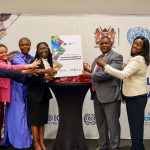President William Ruto has told off leaders opposed to the nationwide livestock vaccination programme against diseases planned for January next year.
The President said vaccination with locally produced vaccines will boost animal health and meat export potential.
He explained that this programme, which targets 22 million cattle and 50 million goats and sheep, is aimed at combating trans-boundary diseases such as foot-and- mouth disease.
President Ruto expressed concern over some leaders, who he accused of opposing development initiatives “just for the sake of it”.
The President wondered why they were opposed to vaccination of livestock against diseases, saying such have stalled the immense potential in the livestock sub-sector.
Speaking during the closing ceremony of the 4th Pastoralist Leadership Summit in Wajir County on Tuesday, President Ruto urged leaders and residents from the ASAL and pastoralist regions to support the initiative.
“Those opposing the programme are unreasonable and maybe they don’t have cattle. When we have a conversation about livestock, just shut up if you don’t have cattle,” he said.
He said the Kenya Veterinary Vaccines Production Institute (KEVEVAPI) produces vaccines for livestock, which are safe for cattle, sheep and goats in the country.
“For the avoidance of doubt, the vaccines we are using are produced by Kenyans. We have a large production of vaccines in Kenya, some of which we supply to other countries,” President Ruto explained.
The President pointed out that Kenya’s meat products are unable to access some global markets because of the prevalence of disease, saying this has necessitated the national vaccination exercise.
The pastoralists’ summit, whose theme was “Unlocking Policy and Financial Bottlenecks to Maximise Pastoralism Potential in Kenya,” seeks to address critical challenges facing pastoralists
At the same time, President Ruto said the government will initiate various interventions to combat insecurity, reduce poverty and eliminate drought in ASAL regions.
The President said the modernisation of police equipment has drastically reduced cases of insecurity occasioned by banditry and cattle rustling.
“We need partnership among leaders, residents and security personnel in ensuring peaceful co-existence among the pastoralist communities,” he said.
The President pointed out that to reduce poverty and eliminate drought, the government, through the Equalization Fund, was spending KSh18 billion to implement 1,200 development projects to transform the region.
“I have also signed the Water Bill that will boost water harvesting for storage to unlock the agricultural and livestock potential in arid and semi-arid areas,” he said.
Meanwhile, President Ruto has committed to appoint members of the Livestock Marketing Board. He said the State corporation must organise pastoralists into cooperatives and ensure equitable access to markets.
He asked the State Department of Livestock to ensure the board is all- inclusive.
On the other hand, President Ruto cautioned against tribalism, saying his collaboration with former President Uhuru Kenyatta and former Prime Minister Raila Odinga is aimed at building a better and more inclusive Kenya.
“We should continuously build bridges instead of creating barriers,” he said.
The President also urged residents in pastoralist communities to take up teaching courses.
“Young people from this region should enrol in teaching courses and end the situation where the region relies on teachers from elsewhere,” he said.
President Ruto said whenever insecurity challenges in the region heightened, teachers from other counties seek transfer and leave schools understaffed.
He said the summit is a critical forum for advancing key agendas, and its legacy reflects positive impacts.
“The first summit, held in Narok in 2014, shone a spotlight on peace, security and the infrastructure deficit, which required urgent attention. In 2016, the Isiolo summit advocated the operationalisation of the Equalisation Fund and the expansion of livestock markets. The Garissa summit in 2019 focused on socio-economic development, counter-radicalisation and the promotion of community climate resilience,” he said.
Those present at the function were Cabinet Secretaries Beatrice Askul (EAC, ASALS and Regional Development) and Aden Duale (Environment).
Others were Governors Mohamud Ali (Marsabit), Anyang’ Nyong’o (Kisumu), Ahmed Abdullahi (Wajir) and Mohamed Adan (Mandera), and several MPs.
Pastoralists Parliamentary Group Patron Dido Rasso, who is also the Saku MP, thanked President Ruto for ensuring communities in the region benefitted from the KSh1 billion Livestock Fund .
He said the fund will enable those who lost livestock during the recent drought to restock.





